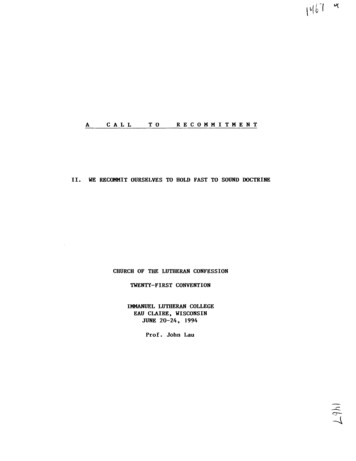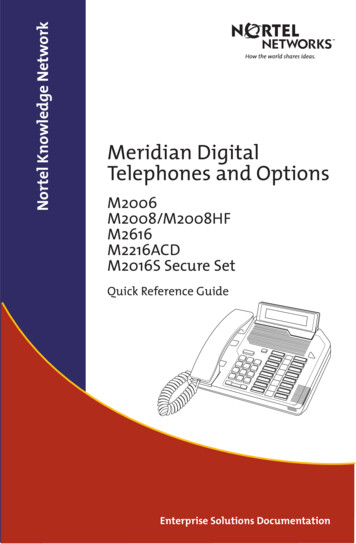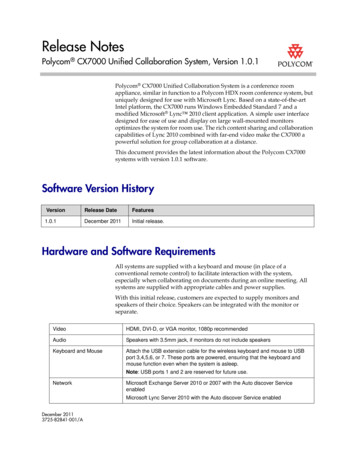
Transcription
1)(ACALLT 0RECOMMITMENTII. WE RECOMMIT OURSELVES TO HOLD FAST TO SOUND DOCTRINECHURCH OF THE LUTHERAN CONFESSIONTWENTY-FIRST CONVENTIONIMMANUEL LUTHERAN COLLEGEEAU CLAIRE, WISCONSINJUNE 20-24, 1994Prof. John Lau
A CALL TO RECOMMITMENTII. WE RECOMMIT OURSELVES TO HOLD FAST TO SOUND DOCTRINEIntroductionA former pastor of the CLC recently wrote, "In my yearsin the CLC I observed that the Gospel is present,but it is not central. The primary message coming from them is thedoctrine of church fellowship in one form or another." At the sametime, a pastor member of the CLC writes: "If a poll were taken todetermine the least popular teaching in the CLC, the consensus wouldlikely indicate the doctrine of Church Fellowship."These two statements appear to be in contradiction to each other,as is natural, since they are observations from without and withinthe fellowship of the CLC. The former writer is basing his commenton the historical development of our church body only, whereas thelatter writer is considering the positive, evangelical effects ofa strong doctrinal position. In a sense, the three-fold divisionof this convention's essay, designed to be A CALL TO RECOMMITMENT,needs to consider both of these two aspects: our history and ourmission.But the validity and worth of these aspects depend uponthe message we proclaim, namely, the doctrine. That is why we aretoday given the theme: "We recommit ourselves to hold fast to sound doctrine." It is the present writer's prayerful intent to demonstratefrom several portions of the word of God the vital importance ofsuch a recommitment.I. Christ warns against false prophets."Beware of false prophets, which come to you in sheep's clothing,but inwardly they are ravening wolves. Ye shall know them by theirfruits" (Matt. 7:15-16a). This warning of our Lord is just as appropriate in our day as it was when He spoke it--and false prophets canbe just as difficult to detect today also. We cannot complacentlysay to ourselves, "Why should we worry? When a false prophet denies Godwe simply won't listen to him!" Christ was not speaking of someonewho openly denies Him, or, as we might say, one who comes in wolves'rather, He described a false prophet as coming in sheep'sclothing;clothing. That is to say, he gives the appearance of being a truemember of the flock of Christ, a necessity for the false prophet.He must disguise himself, or else all Christians would flee fromhim instantly, and he would succeed in trapping no one. Therefore,we are not surprised, for example, if a false prophet bears the nameof Christian, or even Lutheran, for that matter.A false prophet may preach in a way that is most attractive;he may use music and liturgy that has a modern beat; he may conducthimself in a manner that portrays his message as just like that ofthe fathers. A hunter also uses decoys and calls to give the unwarywild duck the impression that all is serene down below; but whenthe duck has fallen into the trap, then he leaps out of the blindwith gun ablaze, and reveals himself as he really is. Thus it is
2with the false prophet, for Christ tells us his true nature: inwardlyhe is a ravening wolf! Yes, false prophets are wolves whose natureit is to rend, tear, and kill with their cruel fangs. Vividly Jesuspictures their destructive work:it rends and tears the sprituallife of the Christian like the fangs of a wolf.How sad it is thatin spite of this strong warning many still persist in thinking ofdeviations from the true word of God as being quite harmless! Howmuch better it would be to accept this warning as we accept warningsigns surrounding areas in which bombs are tested! After all, bombs areable only to destroy the body, whereas the deception of the falseprophet can cause the soul to be lost.In spite of this deception, however, the Christian can detectfalse prophets and beware of them. Christ tells us simply that wecan know them by their fruits. But what are the fruits of false prophets? Here again, let us not make the mistake of thinking only oftheir external lives or works. They may appear to have great success atfirst glance, like "televangelists" or church growth enthusiasts,and thus many may be tempted to think that God is blessing theirefforts. This appearance may deceive all the more because, as Scripturewarns, there are so many false prophets!But this is not the fruitof which Jesus speaks.Their fruit is their doctrine, or teaching.We cannot judge their hearts; only God is able to do that and todistinguish hypocritical from genuine works. Nor can we judge thesincerity of the false prophet, for they may be ever so sincere!Then, too, they themselves may have been deceived by Satan, the greatestfalse prophet of all!As a professional fruit grower judges his fruit by comparingthe fruit of excellent varieties with that of worthless varieties,so is the Christian able to judge the false doctrine, the fruit,of the false prophet, by comparing it with the pure doctrine of the wordof God.The people of Berea are praised in the Bible because evenwhen St. Paul taught them, "they searched the Scriptures daily,whether those things were so." If the Bereans had not learned the truthfrom scripture, they would not have been able to judge whether St.Paul was a false prophet or not! It must be added that the amountof false doctrine taught is not the proper basis for judging it.An apple that has only one small worm in it is still a wormy apple!So it is with doctrine: even the slightest deviation from the completetruth of God's word is false doctrine. Jesus is extremely narrow-mindedwhen it comes to His word. When He gave the commission to His disciplesto go into all the world, preaching and baptizing, He told them toteach "all things whatsoever I have commanded you."Therefore, whenwe hear any preaching, no matter who the preacher may be, let ushabitually compare it with God's pure word. If what we hear is notin complete and full agreement with God's word, then it is falsedoctrine, and the one who keeps on teaching it is a false prophet,a causer of divisions and death traps who must be avoided, lest webe taken in by him and deceived.2. Disunity in confession may arise among followers of Christ."Take heed therefore unto yourselves, and to all the flock,over the which the Holy Ghost hath made you overseers, to feed thechurch of God, which He hath purchased with His own blood. For Iknow this, that after my departing shall grievous wolves enter inamong you, not sparing the flock.Also of your own selves shall
3men arise, speaking perverse things, to draw away disciples afterthem" (Acts 20:28-30). When one looks back over the centuries sincethe Lord Jesus first founded His church on earth among a handfulof disciples, one cannot help being plagued by a question which hasarisen again and again: How did it happen that a once confessionallyunified group of believers did not stay unified, as time went on?As we look about us in the world today, we are deeply saddened bythe fact that so many who call themselves Christians neverthelesshave such widely divergent confessions of faith (or virtually noconfessions at all).This distressing state of affairs is not according to God'swill and desire. St. Paul wrote to the Corinthians, "Now I beseechyou, brethren, by the name of our Lord Jesus Christ, that ye allspeak the same thing, and that there be no divisions among you; butthat ye be perfectly joined together in the same mind and in thesame judgment" (1 Cor. 1:10) — that is God's will! And the unityof confession which God desires is to be a unity based upon Him andHe is against all those who introduceHis holy word, nothing else!Thesomething different from His pure word into their doctrine.prophet Jeremiah, inspired by the Holy Ghost, described the willof God thus:"'Behold, I am against the prophets,' saith the Lord,'that use their tongues, and say, "He saith." Behold, I am againstthem that prophesy false dreams,' saith the Lord, 'and do tell them,and cause My people to err by their lies, and by their lightness;therefore they shall notyet I sent them not nor commanded them;profit this people at all,' saith the Lord" (Jer. 23:31-32).In Chapter 20 of the book of Acts we read that St. Paul hadcalled together the elders of the congregation in Ephesus to meetwith him at Melita, on his way to Jerusalem, where he would be takencaptive by his enemies and eventually transported to Rome for trial.Under such circumstances, Paul wanted to give to these Christianleaders what might well be a last word. His words were a warningto them and to us that disunity in confession may arise among followersof Christ by attacks both from without and within. Those who attackfrom without Paul calls "grievous wolves," the same vivid term thatChrist used in His warning against false prophets. The Ephesianelders were urged to provide the strong shepherding that is neededto protect the flock. No doubt, Paul was thinking of such attackers asthe so-called "Judaizers," who taught that belief in Christ was notsufficient for salvation, but that one must also still observe allBut, in a larger sense,the Old Testament ritual and ceremonial laws.Paul spoke of all who come with doctrines different from those taughtin the sacred scriptures.One must surely be on guard against allsuch.Even more urgent, however, is the additional warning: "Alsoof your own selves shall men arise, speaking perverse things, todraw away disciples after them." Bringing in destructive false doctrines from heterodox churches or even from unbelievers is bad enough,but still worse are those who arise within an orthodox church orWolves which enter fromcongregation and teach false doctrines!the outside, sparing not the flock and destroying souls, are easierto recognize and identify;when, however, perverse men who arisefrom within, especially when they are pastors or teachers, may conquerby dividing;they draw poor, deluded disciples after them and cause
4great schisms and sects. The historical review which is includedin the first part of this three-part essay surely reveals that thebirth of our own CLC was the result of grievous error which was permittedto enter a formerly orthodox church body and synodical conference.May that experience serve to remind us again and again to recommitourselves to hold fast to sound doctrine.Paul prefaced his admonition to the Ephesian elders by saying:"I have not shunned to declare unto you all the counsel of God." Hewas but echoing Christ's admonition to teach all things, "whatsoeverI have commanded you." Paul's task among these people had not beento present his own personality or opinions to them, but to serve themas God's ambassador, to bring them the pure doctrine of God's word.Now, in his absence, he greatlyIn this Paul had not been remiss.To do so, theydesires that this continue to be done by the elders.are to take heed, in the first place, to themselves. They are toexamine their teachings in the light of God's word, to see to it thatthey are in agreement, in all parts, with that precious treasure ofthe church.When they are assured of this, then they are to carefor the flock.Thus did Paul admonish them to recommit themselvesto hold fast to sound doctrine.This is not to say that the recommitment is only for the eldersof the church; it is not to say that the flock merely follows blindlyin whatever directions it is led! All too often, however, a congregation's doctrine and practice is guided almost solely by the individualcalled to be the pastor. If his doctrine and practice is sound andbiblical, theirs is also likely to be; but if his doctrine and practicego astray, all too often so door theirs! What a great responsibilityrests, then, on the shepherd! And what a tragedy it is when he misleadsthe flock!But it has also happened in church history that the flockOf course, when they refuse tohas refused to follow the shepherd.follow a false leader, they are pleasing their Lord; but if theirpastor is pointing out the right paths, if he is feeding them withthe pure word, if he is trying with all his might to protect themfrom the wolves without and false teachers within, and they refusethen he is helpless, for the kingdom of God is notto follow him:governed by force, after all. In such a case, it must simply be saidthat disunity in confession and life has been caused by the failureof the flock itself to be on its guard against the temptations anddangers that surround it.3. All Christians are to judge doctrine."These [the Bereans] were more noble than those in Thessalonica,in that they received the Word with all readiness of mind, and searchedthe scriptures daily, whether those things were so. Therefore manyof them believed; also of honorable women which were Greeks, and ofmen, not a few" (Acts 17:11-12). As we examine the teachings of scripture, it is evident that God wants His church to present a unitedtestimony and that He wants disunity to be prevented. This is a veryserious matter, because it is the truth of God's word that is at stake.In view of this, there is an incontestable thought that becomesmore and more fixed upon our consciousness, as we meditate upon thesethings: namely, that our. Lord expects us to judge doctrines as theycome to our attention from this side and that in this world of change.
5Quite often it seems that there are just as many different doctrinestaught as there are individuals to teach them! What are we simpleChristians to do, when so many different and conflicting doctrinescome to our ears? How are we going to know what is true and whatis false? With whom are we to fellowship, and whom are we to avoid?All too often, sadly enough, many people (perhaps most) have decidedto leave such matters to the clergy to decide. Quite often it hasbecome the practice of a particular church body to turn over all problemsof doctrine to the judgment of a seminary faculty. However, this isa dangerous practice, for it lulls people into a complacent attitude.More than that: it is actually the selling of a birth-right, givenby the Lord Himself, for a mess of pottage! For God has given to eachindividual the right and privilege to read for himself the preciousword of life and behold with his own eyes and ears the great gospelmercies of the Lord. How tragic it is when a Christian casts thatprivilege away as though it has no value; how tragic it is when aChristian puts his trust in another human being and neglects his ownpersonal privilege of judging doctrine!Luke, the inspired writer of the book of the Acts of the Apostles,describes the Bereans as being nobler than those in Thessalonica fortwo reasons: (I) they receive the word of God with readiness of mind,and (2) they search the scriptures daily [to determine] whether thosethings [they heard from Paul and Silas] were so. The Greek word for"nobler" means "well-born" or "high-born," but also has the connotationof "high-minded." The nobility of the Bereans lay in the way theyregarded the word of God. It certainly was not an attitude which theyhad by nature, for man's nature hates God and all His works, includingHis word! It was an attitude which the gospel itself worked in them.Beyond that, it does not behoove us today to ask why the Bereans weredifferent from others; rather, let us pray that God would grant usa measure of their "nobility" also. What a blessing to receive God'sword with all readiness of mind! What a blessing to search the scriptures daily, verifying that what we hear from our pulpits and lecterns orwhat we read in our bulletins and church publications is truly inagreement with pure doctrine!The Bereans did not know it, but they have occupied a shiningplace in the New Testament scriptures for nearly 2,000 years. Whatthey did is exactly what God desires of the CLC today, as we recommitourselves to hold fast to sound doctrine: namely, that we daily examine,truly examine, the scriptures. The Bereans' examination could resultonly in one verdict, regarding what they heard from Paul and Silas:"These things are so!" Such faith could only result in holding fastto the doctrine they learned, for it rested solidly on the word ofGod. What a great gift of God it is, that all doctrines are basedupon what are called, in Latin, "sedes doctrinae" ("seats of doctrine"),that is, specific passages of scripture which are so clear and soprecise that they need no interpretation whatever to be understood.Can all Christians judge doctrine? Indeed, they can, for theHoly Spirit has come, as Christ promised, to create faith and grantenlightenment. Surely we desire that those who are called to proclaimthe Gospel publicly, as pastors and teachers, shall be solidly trainedin theology and, as much as possible, in the original languages ofthe scriptures. But, especially in our day, when the Bible is soreadily available for everyone to read, there are many opportunities
6for all Christians to read their. Bibles and grow daily in knowledgeand understanding — and then to testify to others. One is remindedof the golden opportunity that came to a married couple named Aquilaand Priscilla, who were living in Ephesus when an eloquent preachernamed Apollos came to town.Apollos was bold and diligent, but hisknowledge of the gospel was incomplete. When Aquila and Priscillahad heard Apollos speak, they took him home with them and "expoundedunto him the way of God more perfectly" with the wonderful resultthat when Apollos went on to Achaia he "helped them much which hadbelieved through grace, for he mightily convinced the Jews, and thatpublicly, showing by the scriptures that Jesus was Christ" (Acts 18:2428). We cannot predict when such a glorious opportunity may come ourway!Therefore, let us pray that we may be ready and prepared tohold fast to sound doctrine when the time comes!4. All Christians are to be united in doctrine."Now I beseech you, brethren, by the name of our Lord Jesus Christ,that ye all speak the same thing, and that there be no divisions amongyou; but that ye be perfectly joined together in the same mind andin the same judgment" (I Cor. 1:10). There was once a flourishingand healthy congregation of people who had joined together in thecommon worship of the Lord Jesus Christ. This congregation had manyadvantages. First of all, it was located in a city that was growingrapidly and was filled with ever-increasing commercial development.Secondly, this congregation had the advantage of having a successionof pastors who were eloquent and well-trained in the scriptures andpreached God's word faithfully and well.Into this wonderful situation, however, crept a disease thatwas threatening, finally, to force this congregation to dissolve inthe worst sort of disunity. Some members of the congregation boastedthat they had been baptized by a certain one of their ministers; othersresponded with a boast of their own, namely, that they were followersof another great minister. Still others stood proudly apart from thisbickering and claimed to be the real leaders of the congregation becausethey followed only Christ! Other problems arose, a long list of them, tobe sure: Worldly wisdom as opposed to God's wisdom, envy, strife,division, fornication, unrebuked incest, law suits against each other,eating meat offered to idols, idolatry, marital problems, problemsover the Lord's Supper, problems with Christian liberty, the headshipof the man in church and marriage, heresies, problems over spiritualgifts, problems with worship practices and women preaching, problemswith resurrection! — What a sad state of affairs!This sad story of a Christian congregation is not fiction. Itis the true account of what actually occurred in the early churchin the city of Corinth, in the southern part of Greece. Our heartsgo out to the people of that congregation in their distress. But wealso cannot help thinking with pity of the ministers who had broughtthe gospel to them; particularly, we think of St. Paul, who had foundedthe congregation. When he heard of the situation, though absent, hedid not leave them in their distress; inspired by the Holy Spirit,he sent them a marvelous letter, in which he brought to them the sounddoctrine of the word of God, which alone could help them.Paul'swordshaveadeepmeaning forus also,aswe recommitourselvesto hold fast to sound doctrine, for they give us a true insight into
7the doctrine of the Church. All members of the Holy Christian Church(the communion of saints, believers) are truly united by the commonfaith in Jesus Christ bestowed on them by the Holy Spirit throughthe means of grace; the Lord desires that the visible assemblies (congregations, synods, church bodies) of individuals gathered around thepreaching of the gospel be perfectly united and of one voice in confession, doctrine, and practice. Though Paul gave the Corinthians counselin all their problems, he began at their underlying difficulty (disunity)and admonished them to seek unity in the only way possible, namely,on the basis of sound doctrine, the word of God.We do not perceive Paul's admonition to be the approach of legalism."Now I beseech you, brethren, by the name of our Lord Jesus Christ"is an evangelical approach, and at the same time we realize that itis the apostle of the Lord speaking inspired words from Christ Himself.All Christians are to speak the same word of God's truth, and thereare to be no divisions among us. When the word of God is taught andpracticed in its truth and purity, there will be doctrinal unity andno doctrinal divisions. We cannot stress this point too much, forin our own times there is much discord and disagreement among churchesand church bodies that identify themselves as Christian, let alonethe many religious organizations that cannot or do not desire to makethat claim. Even among the "Lutheran" church bodies it does not requiremuch research to observe that the vast majority of their members seemto be willing to have a great variety of false theological opinions,doctrines, and practices carried on together with what remains oforthodox doctrine and practice, to say the least. Some Lutheran theologians in ELCA seminaries, for example, are even willing to deny thatJesus arose physically from the dead! Sad to say, there are manywho defend this wide variety of doctrines and practices, saying that,after all, "no one has all the truth, and therefore we need the differingtestimony, with each one presenting truth as he sees it." Thus theydeny the verbal inspiration, inerrancy, and infallibility of scripture!When our Lord Jesus Christ once declared that "the scripturecannot be broken," He was saying that every word of the inspired scriptures combines with every other word to form a complete unity. Theresimply are no contradictions in the Bible; apparent contradictionsare due to human lack of understanding. Scripture is its own interpreterand guide. The word does not teach contradictory doctrines; rather,it is "a lamp unto our feet, and a light unto our paths." God hascaused it to be written that He is against the prophets who proclaimtheir own dreams and claim that "He (God) saith"; He adds that Hedid not send them! (Jer. 23:31f.)When there is unity in confession, doctrine, and practice, thenno doctrinal divisions will be suffered among Christians, unlike theCorinthians who had suffered the case of incest in their midst. "Schismata" is the Greek term that Paul uses for "divisions," meaning "factions"or "parties that disrupt." The natural consequence of permitting twoor more differing and opposing doctrines to stand on an equal parwithin a congregation or church body is that each will attract itsfollowers. The result can only be that, instead of a group with aunified doctrine, there will soon be factions, separate parties, eachinsisting that its teachings are correct. Many would then be temptedto try to effect some kind of compromise, as we are accustomed todo in politics or labor relations.Compromise has become "the nameof the game" in modern church negotiations. Two examples are the 1950
8so-called "Common Confession," adopted by the Lutheran Church—MissouriSynod (LCMS) and the American Lutheran Church (ALC) as a settlementof past doctrinal differences which were, in fact, not settled, as wasamply pointed out: ". the adoption of the Common Confession bythe Lutheran Church—Missouri Synod involves an untruth and createsa basically untruthful situation, since this action has been officiallyinterpreted as a settlement of past differences which are in factnot settled"; and the extensive negotiations leading to the formationof the Evangelical Lutheran Church in America (ELCA) in the late 1980s,in which it was recognized by the three merging church bodies thatmany doctrinal matters remained unresolved. What happened in bothof these instances is what always happens when an attempt is madeto compromise opposing doctrines, namely, that wordings and phrasesare eventually found and used which are at least partially acceptableto everyone, with the doctrine becoming so vague and indefinite thateveryone can read into it whatever he wants. Dr. Franz Pieper wroteconcerning this: "(St. Paul) clearly says that Christians are to usethe same words also in the same sense. Agreement in words with disagreement in meaning is altogether contrary to the unity God calls for,and to seek such a 'unity' ('we agree to disagree') is immoral, atrifling with sacred, divine things, which is unseemly for Christians."How tragic it is that the admonition of Paul that all Christianstaken to heart by so many,are to be united in doctrine is notHow it must grieve the Savior toin the past and also in ou day!down His life to be in such lack of agreebehold those for whom Hement concerning His teachings! Let us most earnestly pray that theHoly Spirit may rest upon us and abide with us always, so that wein the CLC may hear and heed the Lord's admonition to remain unitedin doctrine and practice.5. God's word shows us when to terminate existing fellowships."Now I beseech you, brethren, mark them which cause divisionsand offenses contrary to the doctrine which ye have learned; and avoidthem. For they that are such serve not our Lord Jesus Christ, buttheir own belly; and by good words and fair speeches deceive the heartsof the simple" (Rom. 16:17-18). Historically speaking, it is indeedtrue that the CLC would not have come into existence if the churchbodies of which we were formerly members had been obedient to thesound doctrine contained in Romans 16:17-18. For nearly two decadesthe Wisconsin Evangelical Lutheran Synod (WELS) and the EvangelicalLutheran Synod (ELS) had taken note of the fact that their sistersynod in the Synodical Conference, the Lutheran Church —Missouri Synod(LCMS), had drifted away from sound doctrine and had become deeplyinvolved in the sin of unionism (joint worship and work among churchesand church members who are not united in doctrine and practice).In 1955 the convention of the WELS had unanimously declared that theLCMS was causing divisions and offenses which were "of long standing."Nevertheless, in spite of the Lord's admonition to avoid such causersof divisions and offenses, the WELS and ELS postponed such an action.In 1959, in another WELS convention, the false doctrine which layat the heart of such postponement was revealed, when the WELS acceptedthe following doctrinal statement as correct: "Termination of churchfellowship is called for when you have reached the conviction thatadmonition is of no further avail and that the erring brother or churchbody demands recognition for their error."
9The CLC was formed, then, in obedience to God's word, by thosewho knew that they had no other choice, under God, than to avoid theWELS and ELS also. A review of our past reveals this, as a view ofour mission demonstrates that we exist for a larger purpose than toprotest and avoid! Throughout, as a commitment to hold fast to sounddoctrine was the foundation of our past, so a recommitment to holdfast to sound doctrine is the keynote of our mission."Holding fast" includes the awareness of how precious sound doctrinetruly is. All the doctrines of scripture are the handmaidens of thatmost precious good news, the gospel, which tells the world of itsredemption through the death and resurrection of Christ Jesus. Weare grieved whenever such doctrine is denied, or altered, or disobeyed,for it is the truth which makes us free. It is, therefore, an extremelyserious matter when an individual, or a congregation, or a churchbody, causes divisions and offenses contrary to the pure doctrinewhich we have learned. It is not enough merely not to listelih,to suchcausers; they are to be spiritually avoided, that is, we are no longerto worship or do church work with them in any form.It is wrong to avoid only when we come to some sort of subjectivejudgment that admonition will never be heeded, for that judgment isnot in our power to make (only God reads the heart).When, then,do we terminate the practice of fellowship? God's word shows us."Mark" means "keep on watching out for" or "keep your eyes open for.""Them which cause" or "causers" is a present participle in the Greek,indicating an on-going activity, rather than a temporary lapse whichis soon corrected. "Divisions" are the very opposite of that confessionalunity which God asks of His people (1 Cor. 1:10). "Offenses" is avery serious term; it literally means "death traps."The seriousnessis emphasized by describing divisions and offenses as being "contraryto the doctrine which ye have learned.""Avoid" means to terminatefellowship relations, as already indicated. Therefore, the CLC hasdeclared the doctrine: "When it has been ascertained that a churchbody is causing divisions and offenses contrary to the doctrine ofHoly Scripture, the directive to avoid is as binding as any word addressed to us by our Savior God in Holy Scripture. The apostle's peremptoryekklinate ("avoid") is the voice of the Good Shepherd Himself, asHe lovingly protects
IMMANUEL LUTHERAN COLLEGE EAU CLAIRE, WISCONSIN JUNE 20-24, 1994 Prof. John Lau. A CALL TO RECOMMITMENT II. WE RECOMMIT OURSELVES TO HOLD FAST TO SOUND DOCTRINE . The people of Berea are praised in the Bible because even when St. Paul taught them, "they searched the Scriptures daily, whether those things were so." If the Bereans had not .










